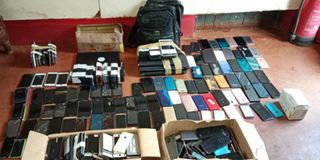
A man alleged to have stolen a mobile phone gets roughed up by matatu touts at Machakos country bus terminus in Nairobi on Wednesday, July 18, 2018. He was handed over to the police.
| File | Nation Media GroupNews
Premium
Kenya’s phone theft syndicate: Every 10 minutes someone loses a phone to muggers
What you need to know:
- Many Kenyans admit to having lost their phones to snatchers and muggers on motorcycles, on foot, in matatus or at night clubs, but the brazen tactics employed by the criminals have reached alarming levels, with the stolen devices being ‘flashed’ and smuggled to neighbouring countries and a ready market
- Mondays come with long queues at Safaricom, Airtel shops as victims replace SIM cards.
Every 10 minutes, someone in Nairobi loses a smartphone to thugs. Security sources say most of these cases go unreported, making it difficult to apprehend the criminals.
The incidents have become so rampant that the Directorate of Criminal Investigations (DCI) has had to seek Interpol support to curb the smuggling of the gadgets to neighbouring countries.
At the same time, at least 10 Nairobi residents have been killed by phone snatchers this year alone.
Nairobi Regional Criminal Investigations Officer Peter Njeru told the Nation that one of the victims, a young woman, was stabbed in the neck by a thug who targeted her gadget, which was worth less than Sh20,000.
While Nairobians will admit to having lost a phone or two in the city, either to snatchers on a motorcycle, on foot or in a public service vehicle, the brazen tactics employed by the snatchers have reached alarming levels, prompting an operation led by detectives from the elite Crime Research and Intelligence Bureau (CRIB) based at the DCI Nairobi Regional Command.
Demand for smartphones has soared after the government increased levies and taxes on imported phones by up to 41 per cent. Prices have risen by at least 35 per cent as dealers pass on the new 25 per cent import duty and 10 per cent excise tax to consumers. The net effect is a thriving black market.
Last week, detectives targeted phone repair shops that are used to ‘flash’ IMEI numbers from devices stolen by thugs in the city for resale, especially in neighbouring countries.

Police officers inspect some of the mobile phones confiscated during a crackdown in Kamukunji estate in Eldoret town on May 9.
The International Mobile Equipment Identity (IMEI) is the 15-digit serial number encoded inside a mobile phone, which is crucial in tracing a lost or stolen phone. The first eight digits identify the individual handset and its model specification.
“The directive was to cut the supply chain. We identify phone repair shops in the city that receive stolen phones under the guise of selling SIM cards. This is after we realised that most of them do not find a market in the country but are packaged and transported to neighbouring countries, including Uganda and the Democratic Republic of Congo (DRC),” he said.
The repair shop owner is charged for each device he can't account for as it is considered stolen property as the recovered devices are verified to identify their victims.
“In cases where the victims confirm that they lost their gadgets in a violent robbery, we ask the shop owner to provide the names of the attackers, otherwise we assume that they are the ones who committed the violent robbery,” Mr Njeru added.

Some of the gadgets recovered by police in Kisii on Thursday, October 19, when they raided a popular building in Kisii town where the suspects had hidden the digital items.
Last week, CRIB detectives arrested two Ugandans who had sneaked into the country to pick up stolen smartphones to smuggle into Kampala.
Malumasi Aisha and Agaba Anestus Majuni were arrested alongside Sarah Njeri and her sister Mary Wangui in Nairobi's Central Business District.
Malumasi, who was the first to be cornered, was found with a parcel containing 13 smartphones, believed to be destined for the black market in Uganda. She then led investigators to Shop E17 in Munyu Business Centre, where her accomplices Sarah Wangari and Mary Wangui were busy receiving more stolen phones.
“After a brief but detailed interrogation, the miscreants hurriedly led the detectives to a fourth suspect, Agaba Majuni, who was waiting for the Uganda-bound package at the Simba Coach bus station. Detectives from the elite Crime Research & Intelligence Bureau based at the DCI Nairobi Regional Command have cast their nets wider for more suspects in what is believed to be an elaborate syndicate smuggling stolen mobile phones into neighbouring countries,” the DCI posted on X.
While each of Nairobi’s nine police divisions receives at least five cases of smartphone theft every day, determining the number of devices stolen each day remains a daunting task because most cases are not recorded as theft. Some are recorded as robbery with violence, murder and other crimes.
“A busy police station like Central can receive about 200 OB entries in a day, how do you separate the ones made from stolen phones? There are many but the exact data is not available. We detect the increase in incidents through the numerous complaints related to mobile phone theft,” a detective told the Nation.
On the other hand, Safaricom does not categorise the reasons for requests for SIM card replacements at its shops.
However, the Nation has confirmed that the leading telco’s shops are busiest on Monday mornings, mainly for customers who want to replace their SIM cards.

Recovered mobile phones and other computer accessories displayed at DCI office in Nakuru town on February 9, 2021.
Although the telco does not categorise the reasons for each card replacement, the trend suggests that a majority of phones are stolen over the weekend.
A vegetable seller who has witnessed several incidents of phone theft told the Nation that most of the thefts occur over the weekend when people are a bit careless with their belongings.
“This is mainly because people tend to be more carefree during weekends, some get drunk and careless while others just lose their situational awareness,” he said.
Mr Njeru notes that a few years ago, mobile phone theft was fuelled by the demand for smartphones in the country.
“But a few years later, almost everyone had a smartphone and that brought the crime down. But now the criminals have created a new market in the region that is fuelling these thefts,” Mr Njeru explained.
Neighbouring countries with low levels of smartphone adoption record the highest number of smuggled phones as citizens do not mind buying second-hand gadgets.
“We are having discussions within the six countries [in the region] to harmonise the tariffs and cost of importing mobile phones so that the devices are available to all to make smuggling of stolen phones unprofitable,” he added.
Deputy Director of Criminal Investigations Ireri Kamwende told the Nation that a special unit has been formed to reduce the vulnerabilities between neighbouring countries that criminals exploit to facilitate the vice.
These include the means of transport used to smuggle stolen phones, intelligence sharing between countries to agree to flag stolen devices through Interpol or the Eastern Africa Police Chiefs Cooperation Organisation (EAPCCO).
On whether the criminals are targeting specific brands, Mr Kamwende said: “Any phone that looks serious, they take.”
Although iPhone users are fortunate that criminals find it difficult to ‘flash’ their devices, making their data secure, the chances of recovering their phones are harder because the IMEI can only be traced after a device has been switched off.
The Communications Authority (CA) has made it mandatory that only licensed telecom vendors can import or distribute mobile phones.
It has also made it mandatory for each handset to have the IMEI number printed on the device, which must be legible, indelible and electronically retrievable by dialling *#06#.
However, criminals have found a way around this by ‘flashing’ the IMEI number to make the phone untraceable.
Once the device has been tampered with, it is difficult to trace, making it easier for the thief to sell it as a whole rather than disassemble it and sell the parts.
The device used to change the IMEI number is called a flasher and is manufactured in China and available on the black market. It is this gadget that mobile phone repair shops in Nairobi use to change a phone’s IMEI number, making it difficult for DCI detectives to trace it.
Data from CA shows that the number of smartphones reached 33,575,476 in September this year, making Kenya one of the leading smartphone adoption countries in the region.
Smartphone penetration in Kenya currently stands at 66 per cent, two levels higher than the rate in the sub-Saharan region, making the country a leader according to the GSMA.
Last year, the GSMA's Global Source of IME Data for Mobile Devices report ranked Kenya as the third country with the highest number of smartphone connections at 52 million, behind Nigeria and South Africa.
The government's plan to introduce low-cost smartphones to encourage greater use of its services will further increase this number.
The GSMA advises victims of mobile phone theft to report the theft immediately to the police and the mobile operator.
“Reporting the theft will be used as evidence that the phone is missing. This is important if the thief is misusing your phone’s mobile services, which could lead to shocking bills at the end of the month. Only with proof of a stolen phone can the operator exclude the service costs,” the company advises on its website.
It also warns that public transport can be a hotspot for phone theft.
“Keep your device safe until you arrive at your destination. Be aware of your surroundings and use your device discreetly. Never leave your device unattended in a public place or in plain sight in an unattended car.”
While Mr Njeru estimates that only three out of 10 Kenyans are sure of recovering their stolen devices, many victims are counting their losses and looking for new ones.
Police warn that criminals mainly target distracted people, so it is important to have situational awareness when crossing the street, especially in crowded places and during rush hours, including in matatus, where some PSV crews double up or team up with pickpockets for a cut.
Others use distraction techniques such as hugging and handing out leaflets, stealing phones from tables in bars and cafes, or snatching phones from the hands of their victims as they cycle past.





